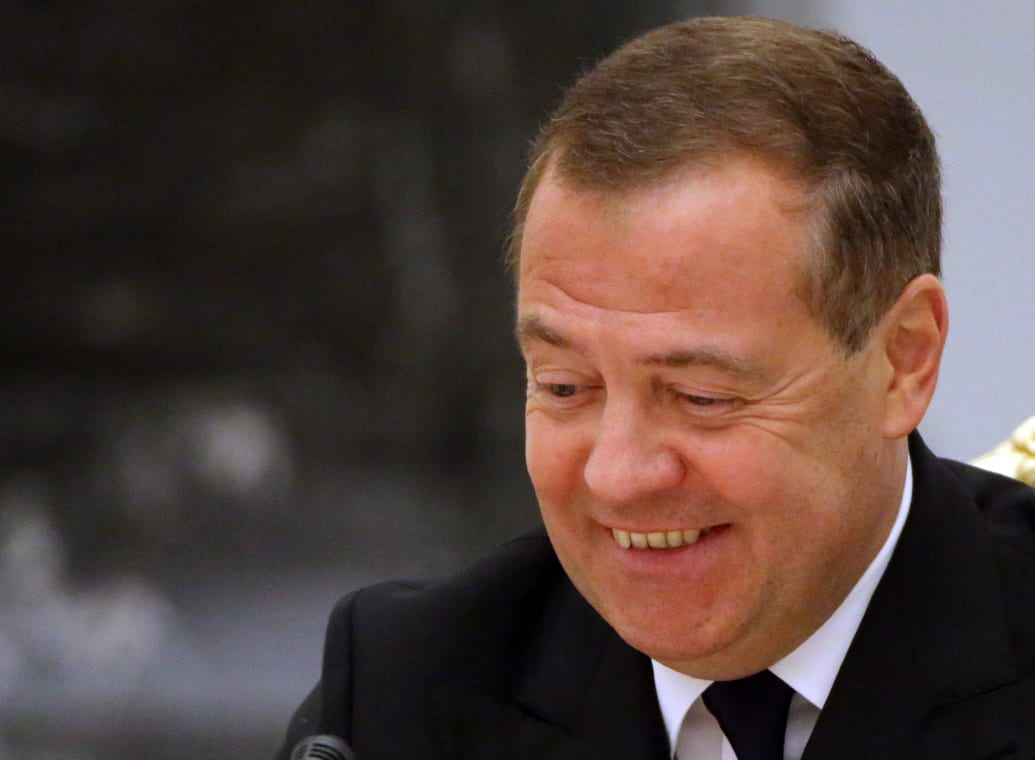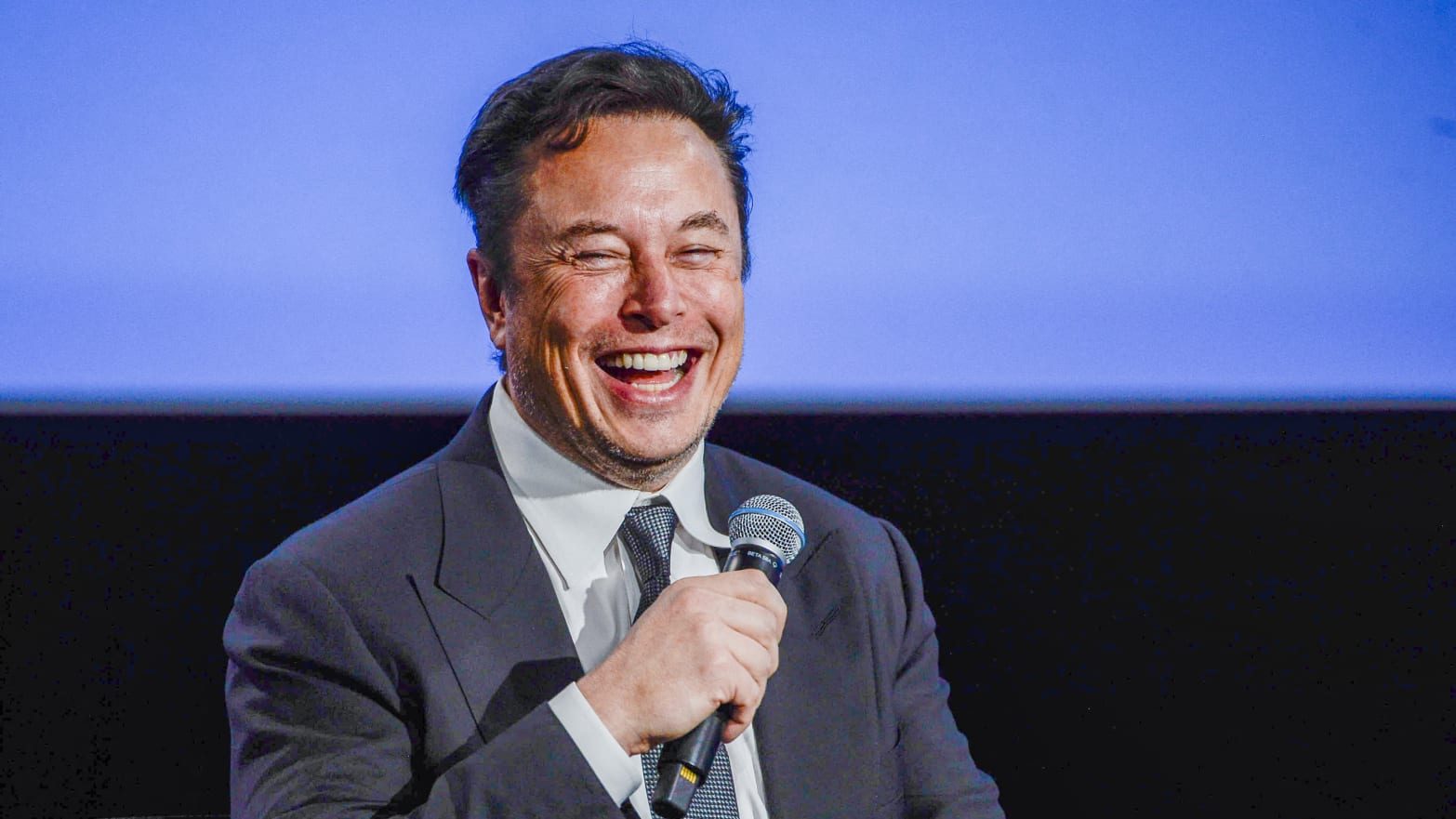On Monday, former Russian President and current Vladimir Putin stooge Dmitry Medvedev issued a flurry of outlandish predictions on his personal Twitter account.
Among them: a Fourth Reich will be created in Europe; there will be a war between France and said Fourth Reich; Poland and Hungary will attack and occupy western regions of Ukraine; civil war will break out in the U.S., which would then split up, with Elon Musk emerging as a president; the E.U. will collapse; the International Monetary Fund would cease to exist; and all stock markets and financial activities will leave Europe and the U.S. and move to Asia.
The so-called forecast made waves in the international media, and earned a response from Twitter boss Musk, who called Medvedev’s ramblings “an epic thread.” True to form, Musk later suggested he was trolling. But candid discussions by Russian pundits suggest Medvedev’s posts were merely a crude plot designed to pollute the Western info-space with narratives of the Kremlin’s choosing—in other words, a troll of his own.
And while it may have been tongue in cheek, Musk’s initial response prompted Russian talking heads to conclude that this info-mission was successfully accomplished.
As Putin’s invasion of Ukraine continues to sputter and stall, Russia’s efforts on the information front are proceeding much more smoothly. One aspect of this warfare is focused on convincing the West that it is about to suffer a series of severe consequences as a result of its support of Ukraine’s resistance against the invading Russian forces. Targeting foreign audiences, state-controlled international media network RT released a distasteful Christmas ad, telling Westerners they will soon be freezing in their homes and eating pet hamsters out of desperation.

Photo by Contributor/Getty Images
Medvedev’s forecast of doom and gloom followed in the same footsteps. It wasn’t meant to be taken seriously, merely striving to muddy the waters. Maximizing the exposure was key, which is why Medvedev’s predictions included the improbable suggestion that foreign-born Musk would become the next president over what is left of the “disintegrating” United States.
The apparent aim of this claim was to attract Musk’s attention, prompting his social media engagement—and it worked like a charm. His Twitter reply to Medvedev’s harebrained pronouncements amplified their Westward spread.
During Tuesday’s broadcast of Radio Komsomolskaya Pravda, writer Nikolai Starikov appeared on the segment hosted by journalist Vladimir Vorsobin, and the two discussed Medvedev’s controversial Twitter thread, divining the dark and gloomy future for Western countries and institutions. While Starikov gushed over Medvedev’s proposals, Vorsobin said he was unpleasantly surprised by their juvenile and facetious nature. The journalist complained about Russian diplomacy descending into the realm of Internet blogging and slinging mud at their opponents, even at the high level of prominent government officials like Medvedev.
Vorsobin noted that Medvedev’s forecast was almost entirely implausible, rendering it pointless as a conversation-starter. Starikov disagreed: “We’re constantly living according to the agenda dictated by Western politicians, Western media, etc. We are discussing what they said, we’re boiling in somebody else’s juices. I believe that one of Russia’s current goals is to be more present in the Western agenda, so that they will discuss what we said or wrote, what kinds of proposals we have, what we’re predicting.... I believe that this forecast was written to make them discuss it in the West. This goal was achieved. Elon Musk reacted.”
Perhaps realizing he might be used by the Kremlin’s propaganda apparatus, Musk added another reply to Medvedev’s Twitter thread, describing his musings as “the most absurd predictions I’ve ever heard.” Nonetheless, the damage of amplifying Russian narratives was already done.
Months earlier, discussions on Kremlin-controlled Russian state television repeatedly veered into Moscow’s intent to take advantage of Musk’s large following to further Russia’s agenda. Appearing on The Evening With Vladimir Solovyov back in October, filmmaker Karen Shakhnazarov opined about Musk’s “tens of millions of fans” and their potential usefulness for Russia’s “info-war tactics” in spreading the narratives set forth by Moscow. Host Vladimir Solovyov enthusiastically supported the idea of engaging “comrade Musk” and proposed Dmitry Medvedev as someone who could be the conduit in Russia’s charm offensive. Americanist Dmitry Drobnitsky noted that while there is no one in the West worth talking to, Russia could “grab a hold and shake them up, for sure.”
Solovyov concurred: “We can troll them.”
Indeed, Medvedev’s dubious forecast is being seen by pro-Kremlin voices as an example of successful trolling. During his segment on Radio Komsomolskaya Pravda, Vorsobin complained that since Medvedev is playing loose with facts and his forecasts, they wouldn’t be treated with seriousness or result in any meaningful discussions. Starikov disagreed, pointing out that Putin recently appointed Medvedev his first deputy in the Military Industrial Commission he chairs—therefore, as a high-ranking government official, his utterances should be treated with the utmost seriousness.
Vorsobin bristled: “Pardon, but when a person is appointed to a high-level position, why is he writing these kinds of things that should be treated ironically? He is involved in serious government business. Why did our top state officials start trolling?” Pointing out some of Medvedev’s predictions about the Fourth Reich and the disintegration of Western countries and institutions, Vorsobin added: “Pardon, this is not just fiction, it’s phantasmagoria.”
Starikov retorted: “It’s not required for all of this to actually happen. Among other things, this is a reminder for Europeans and for the Americans, as to where they pushed the more-or-less stable system that they themselves have built. Now, anything can happen.”
He reiterated: “No one is trying to prompt them to have serious discussions.... This is an element of manipulation of the people.”
Starikov explained: “When you inject this information over there, by getting it published by an important Russian official, containing information that is unusual for Western ears, they start reacting to it. This is just one publication, there should be 50 of them, being posted everyday…. We should be dictating global narratives…. This is an info-diversion in the Western media space.”
He went on to argue that some of Medvedev’s predictions might actually come true in the near future.
Vorsobin then burst his propaganda bubble by surmising: “These are just wet dreams.”

